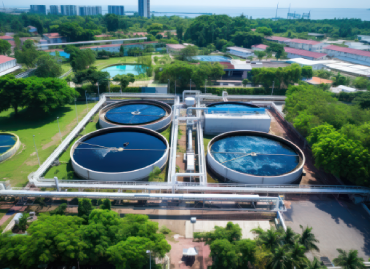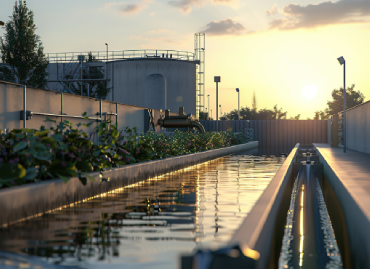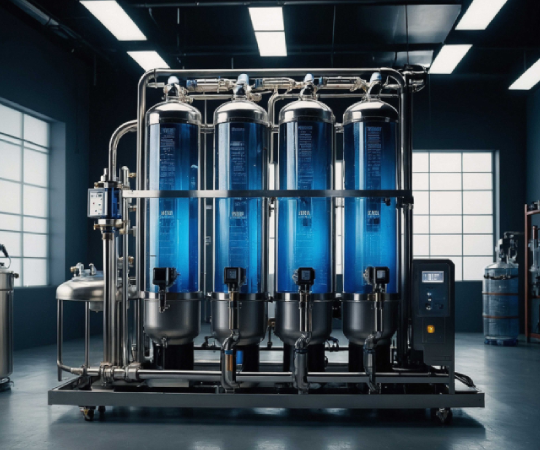- By Admin
- 04 Aug 2025
- WTP Plant
Efficient Water Treatment and Wastewater Recycling Solutions for Residential Apartments Using STP, ETP, RO Technologies
As urbanisation accelerates across India, particularly in major cities like Mumbai, Pune, and Nagpur, residential apartment complexes have become a fundamental aspect of urban life. These high-rise buildings accommodate thousands of residents, and managing water supply and wastewater treatment in such developments is crucial for both comfort and sustainability. From daily consumption—drinking, bathing, laundry, and cooking—to communal amenities like swimming pools, gyms, and gardens, water plays a key role in residential life.
A constant and reliable water supply is required for these activities. However, managing the volume of water needed without straining local resources is a challenge, particularly in densely populated urban areas. The solution lies in integrated water treatment systems that purify and recycle water onsite. These systems ensure a sustainable water cycle, reducing dependence on municipal supply and minimising environmental impact.
"In a modern residential community, water and a shared responsibility are necessary. From drinking to cleaning and from comfort to sanitation, every drop counts. Efficient treatment and reuse of water within residential complexes isn't just good practice—it's a step toward sustainable, responsible urban living for generations to come."
Household and Maintenance Activities Leading to Wastewater Generation
Wastewater generation in residential complexes is widespread. It comes from various household activities such as bathroom use (showers, sinks, toilets), dishwashing, and laundry. Additionally, communal spaces like swimming pools, parking lots, and cleaning of common areas produce substantial wastewater. This wastewater typically includes greywater (from sinks, showers, and laundry) and blackwater (from toilets), both requiring specific treatment processes.
Greywater, while less contaminated than blackwater, contains soap, dirt, food particles, and microfibers, making it unsuitable for direct reuse without treatment. On the other hand, blackwater from toilets carries human waste and harmful pathogens, demanding more intensive biological treatment.
Without proper treatment, these wastewater streams can contaminate the environment, compromise water quality, and harm public health. Hence, residential complexes need to install efficient water treatment systems that handle these waste streams effectively while complying with municipal regulations.


Types of Wastewater and Their Impact on Water Cycles
Residential complexes discharge two primary types of wastewater: greywater and blackwater. Greywater typically originates from sinks, showers, washing machines, and dishwashers, while blackwater comes from toilets. Greywater contains a variety of pollutants like detergents, oils, and dirt, but is still considered less harmful than blackwater, which includes human waste and pathogens.
Additionally, wastewater generated from cleaning chemicals used in common areas, chlorinated water from swimming pools, and water from other recreational facilities adds another layer of complexity. If not properly treated, these pollutants can lead to soil contamination, waterborne diseases, and unpleasant odors. Nutrient-rich wastewater can also contribute to algal blooms if released into nearby water bodies. Hence, residential societies must invest in advanced treatment systems, such as STPs (Sewage Treatment Plants), that can manage both grey and blackwater effectively.
How Residential Apartment Complexes Treat Wastewater Using STP and Filtration Systems
Modern residential complexes often install STPs to treat their wastewater, as mandated by local regulations. These plants use a multi-stage treatment process to ensure the water is safe for reuse. The process begins with screening to remove larger solids, followed by primary treatment to settle heavier particles. Secondary treatment involves biological processes, such as Moving Bed Biofilm Reactor (MBBR) or Sequential Batch Reactor (SBR), that break down organic matter using microorganisms. Finally, the water undergoes disinfection, either by chlorine or UV light, to eliminate pathogens before reuse.
For greywater, advanced filtration systems are often used, including sand-carbon filters, which remove suspended particles and contaminants. Additionally, Reverse Osmosis (RO) units are employed to purify water further, making it suitable for drinking or other potable uses.
Using Modern Technology for Water Treatment and Reuse
Advancements in water treatment technology have revolutionised wastewater management in residential complexes. Today, many high-rise buildings in urban areas use compact STPs equipped with technologies such as MBBR, SBR, and Membrane Bioreactors (MBR). These systems are energy-efficient, space-saving, and capable of handling high volumes of wastewater while ensuring excellent water quality.
Real-time monitoring and automation have become integral to these systems. IoT-based monitoring tools allow for remote tracking of system performance, water quality, and potential issues like leakage or pH imbalance. Automation further reduces manual errors and ensures consistent water quality, making the entire system more reliable.
Treated water can be redirected for various non-potable applications, including landscaping, cooling towers, and toilet flushing, creating a closed-loop model. This approach not only helps in reducing the use of freshwater but also ensures compliance with government regulations. The integration of smart technology supports sustainability and makes residential complexes more self-sufficient.
Tailored Water Treatment Solutions for Residential Projects Across India
We offer end-to-end water treatment solutions for residential apartment complexes. Our services encompass the design, supply, installation, and operation of STPs, WTPs, ETPs, RO units, and water reuse pipelines. We begin with a detailed assessment of water usage patterns, wastewater generation, and environmental requirements, ensuring that the system we provide is perfectly suited to each site.
Our compact STPs are designed to be space-efficient, odor-free, and capable of meeting local pollution board standards. For areas with limited space, we provide modular solutions that maximise available space. We also offer advanced automation panels for remote monitoring, as well as Annual Maintenance Contracts (AMC) to ensure the systems operate seamlessly.
Whether your society is under construction or already occupied, we provide retrofitting and upgrade services to enhance the efficiency of existing systems. Our approach is consultative, focusing on long-term value, compliance, and environmental sustainability. By partnering with us, your residential complex can efficiently manage water and create a model for modern, sustainable urban living.
Summary And Conclusion
With urbanisation on the rise, water treatment and wastewater management have become essential for residential apartment complexes. By implementing effective STPs, ETPs, and RO systems, apartments can manage water demand, treat wastewater, and reduce their reliance on municipal supply. Modern technologies, such as MBBR, SBR, and IoT-based monitoring, ensure high-quality water reuse, contributing to sustainability. Our tailored water treatment solutions provide cost-effective, space-efficient, and eco-friendly options for residential communities across India. By partnering with us, residential complexes can enhance their water management practices, ensuring a sustainable and comfortable living environment for residents.































































